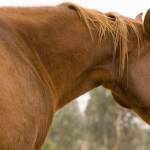Most Older Horses Digest Nutrients Well

In contrast to previous studies, researchers from Michigan State University’s Department of Animal Science found* that healthy aged horses are able to digest their feed as efficiently as healthy young mature horses.
In humans, it is known that nutritional requirements change with age, but little is known about the nutrient requirements of older horses. To fill this void, Elzinga and coworkers recruited 17 stock-type mares: 9 mares between 19 and 28 years of age, and 8 mares between 5 and 12 years of age.
Each horse was serially fed three diets: hay only, hay plus a starch– and sugar-rich concentrate, and hay plus a fat- and fiber-rich concentrate. Each diet was fed for five weeks. At the end of the feeding trial, the different feeds and the feces/urine collected from the horses were analyzed to assess digestibility (the ability of a horse to obtain the nutrients from its feed).
“This study found that older horses in good health and body condition do not automatically require changes to their main diet,” explained Kathleen Crandell, Ph.D., equine nutritionist at Kentucky Equine Research, “because no statistically significant differences in the apparent digestibility of energy, neutral detergent fiber, crude protein, fat, calcium, and phosphorus existed.”
In contrast, one previous study** found that older horses had a lower phosphorus absorption, lower fiber digestibility, and a trend toward lower crude protein digestibility.
So which study is correct? Potentially both.
According to both groups, the finding of altered digestibility in older horses might have been compounded by parasite damage to the large intestine of the aged horses included in the older study. Further, all horses included in the earlier study were all donated to the university where the study was performed, all had clinical problems, and the control group was comprised of horses 2 to 3 years old.
Those confounding factors prompted the researchers to conclude that “…this study evaluated a larger number of healthy horses, all of which had received regular anthelmintic treatment and had acceptable dentition…under most practical feeding situations, differences in digestive capacity are unlikely to be present in healthy aged adult horses…. However, it is important to note that the nutrient digestibilities of diseased aged horses and those with dental disorders may differ.”
*Elzinga, S., B.D. Nielsen, H.C. Schott II, et al. Comparison of nutrient digestibility between adult and aged horses. Journal of Equine Veterinary Science. In press.
**Ralston, S.L., E.L. Squires, and C.F. Nockels. 1989. Digestion in the aged horse. Journal of Equine Veterinary Science 9:203-205.








